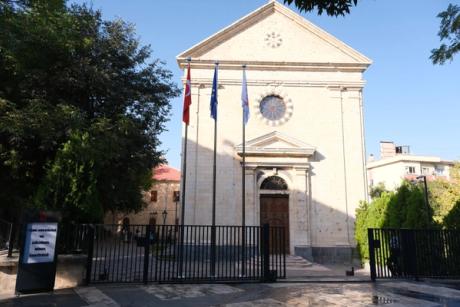
Turkey has unveiled a new archaeology research centre that includes the country’s first archaeometry laboratory and vast digital archive, as well as a promise for greater international cooperation in the field after years of tighter control by the government.
The Є7.5mn Turkish Archaeology and Cultural Heritage Institute, which officially opened on 25 October in a 19th-century defunct Armenian Catholic church in the city of Gaziantep, brings an advanced research facility to a region of the country where excavations at Neolithic sites Gobekli Tepe and Karahan Tepe have disrupted the paradigm on the beginnings of civilisation.
Gaziantep, a city of two million people near the Syrian border, was badly hit during a massive earthquake earlier this year that killed more than 50,000 people and levelled scores of heritage sites across a swath of southern Turkey. Parts of the walls and bastions of the Roman-era fortress that stands above Gaziantep were levelled during the disaster. Fatma Şahin, Gaziantep’s mayor, said in an interview that repairs to the citadel are expected to finish in 2024.
“The fortress, as well as inns, baths and mosques from the Seljuk and Ottoman periods were seriously damaged,” she said. “We lost many lives, but now is the time for rehabilitation. The institute’s opening is part of the healing process, because art and culture helps life to normalise.”
The institute created Turkey’s first digital archaeology archive after scanning 1.4 million documents, including maps, field notes and official documents, from government ministries and the Ottoman archives. It also houses Turkey’s only archaeometry lab for the analysis of heritage materials, helping researchers determine provenance, dating and other data about archaeological specimens.
With funding from the European Union, the Turkish Archaeology and Cultural Heritage Institute’s stated aim is to conduct scientific research from prehistoric times in Turkey and encourage international partnerships with universities and institutions in Europe and the rest of the world on the “basis of shared accumulated knowledge and values of humanity.”
Turkish authorities consulted with the local branches of the British Institute (BIAA) and the German Archaeological Institute (DAI) and relied on software from overseas institutions to establish the centre, says Hakan Tanrıöver of the Turkish Culture Ministry. He adds that it will offer a residency programme to foreign researchers.
Felix Pirson, DAI’s senior director in Istanbul, says his organisation does not yet have a formal relationship with the new institute but would be interested in collaborating “depending on the future organisational structure.” At the opening, he called on the institute to prioritise integration with both Turkish and international research institutions.
“Its rich and diverse archaeological heritage makes Turkey one of the world’s most important international laboratories for the development and application of archaeological questions and methods,” Pirson says. “Innovation in science can only occur through international exchange of knowledge.”
Both Turkish and foreign archaeologists have complained about political interference for more than a decade, accusing the government of attempting to “nationalise” the field by rescinding permits, or threatening to, for sites led by non-Turkish researchers.
Turkish authorities seized a heritage seed collection from BIAA in 2020 in what was described as protection of national independence. In 2016, the Austrian Archaeological Institute lost permission to work at the classical city of Ephesus in a diplomatic row between Ankara and Vienna. Turkey banned French excavations in 2011 in an attempt to force the repatriation of relics from the Louvre, and that same year a threat to scrap the DAI’s permissions was only dropped after the return of an artefact from Berlin.
“This attitude is typical of a desire to nationalise everything, but there is also the trauma of being exploited in archaeology, of objects being removed from the country in the past,” says Edhem Eldem, a historian who works on archaeology during the Ottoman period. “Banning European archaeologists from active participation in digs they have started has been a bad idea. If [the institute] means the government is stepping back and allowing for more collaboration, it is a very good thing.”









